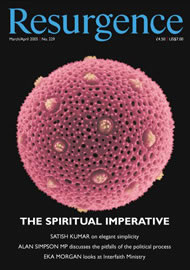In October 2004, I was honoured to give a Schumacher Lecture about the importance of spirituality in business, politics, religion and the environmental movement - in fact, spirituality in everyday life. Spirituality transcends institutionalised religions and is, therefore, a great uniting force. Our co-editors, Lorna and Sophie, have decided to publish my lecture in Resurgence, for which I am grateful.
Spirituality provides a new vision to free us from a reductionist and materialist worldview. Materialism is no longer a secular mode of thinking: as Jeremy Seabrook points out, we are operating under a religion of materialism, which is in stark contrast with traditional faith in humility, simplicity and frugality.
In order to purify politics with spiritual values we need new forms of governance. Such governance should be based on the principle of trusteeship. As Carolyn Raffensperger points out, the responsibility of governments is to ensure that nature and culture are sustained in the interest of future generations of humanity as well as millions of other species. Governance, in this context, has nothing to do with control or power over others and everything to do with service and trust.
Such governance is possible only if administrative units of governments are human-scale. Thomas Naylor argues that the Swiss model of a decentralised political system is much more conducive to ecological and spiritual principles than giant nation-states like the USA, China or India.
Thus, Resurgence presents a vision of a sustainable future where spiritual imperative and 'governance as trusteeship' work in harmony with each other. Such a holistic perspective is further enhanced through articles on the arts, poetry and grass-roots actions taken by numerous individuals. Once again we bring together diverse concepts but all underpinned by a cohesive worldview of wholeness, harmony and interdependence.








